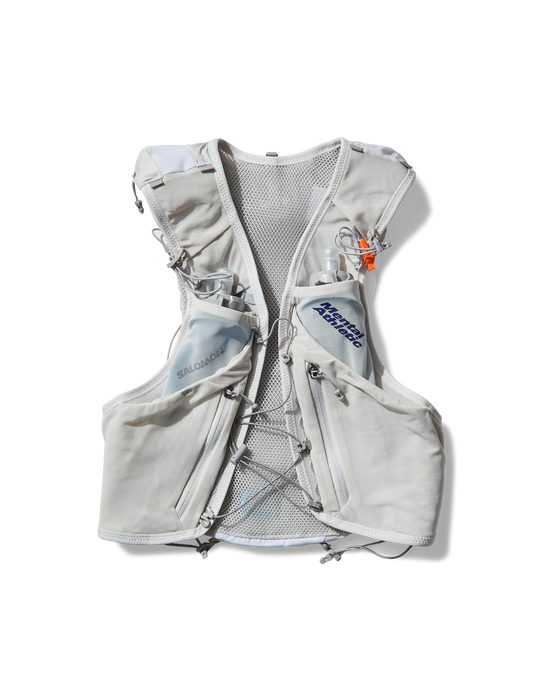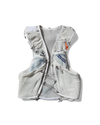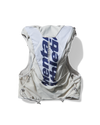FIND YOUR OWN RYTME
SAHRA ABDULAAHI IN CONVERSATION WITH CHRISTEL THUE HØGSTED

Rytme, a one-woman business, is pushing the needle forward in women’s technical apparel. Founder Christel talks design and the radical act of making mindful, high-performance sportswear – made by woman, with woman in mind.

Sahra Abdulaahi: Hej Christel! Tell us about Rytme and why is it here to stay?
Christel Thue Høgsted: Rytme was founded to create technical apparel for women's movement — with the first collection focused on running. Over time, the goal is to build a full wardrobe for an active life. A mission has been to create products without using virgin fossil-based fibers, without compromising performance. The first collection is made from high-quality materials derived from plant oil or 100% recycled fibers sourced from Italy and Japan.
Rytme means “rhythm” in Danish, and it’s meant to inspire people to follow their own rhythm in life and sports — rather than focusing on competition or comparison.Women’s movement isn’t only about women moving their bodies, but also a nod to the women’s movement itself. I believe there's still a lot of work to be done before we reach equality — in society and in the sports product industry.


S: There’s something about Rytme that feels kinetic - at first glance, I was struck by the peaceful energy drenched in quiet confidence, yet it tickled me to move. What inspired that energy?
C: I guess my aesthetic is very Danish. The light here is cold, and that influences which colors look good in this environment. I like when products are very clean and simple. I do believe it takes confidence to design products that at first glance appear simple — but are complex in their construction, assembly, and materials. I don’t want to add any unnecessary fuss to a product. The pieces I love and keep wearing are extremely simple, have a great fit, and are made with high-quality materials in beautiful colors.

S: Word on the street is that Copenhagen’s active spirit can be pretty inspiring when it comes to starting your own small biz – Is your vision rooted in place?
C: I don’t think I feel particularly inspired by Copenhagen. To me, it’s just home — and hard to analyze from within. My way of life and design values are rooted in what matters to me and my upbringing in Århus. It was a very free upbringing, which led me to find my own passions without anyone’s interference.
Copenhagen does have a special feeling, which I appreciate every day. I commute by bike through the city — from Nørrebro, through downtown, across the bridges, through Christiania, to Amager. It's a beautiful route, even in the rain. Most people commute on bikes here and it is reflected in what we wear. If it doesn’t work on a bike, when will you wear it?
I see sportswear as an American invention — at least, they’ve dominated the space for decades, and I deeply respect the innovations they’ve made. That’s also why I chose to move there a few years ago. But I think Europe is taking the lead now, with a lot of smaller brands showing a new way forward for sportswear. That’s very exciting. I’m not seeing pure innovation happening in Europe, but maybe we don’t need that right now — it's more about offering a fresh approach to sport that feels relevant for today.


S: Remember "pink it and shrink it". Thankfully, we've moved beyond this male-centric logic. Yet, we’re a far cry from equality and technical sportswear often overlooks women’s specific needs. What blind spots remain in the industry and what needs to be unlearned?
C: I still find it a very relevant issue. It's a hard topic to talk about because it’s structural — which makes it hidden and difficult to pinpoint. You notice it if you know what to look for. I’ve seen women’s tights where the size guide only includes waist measurements, not hips. That tells me they weren’t designed for women.
Most sportswear companies are founded by men — if you take yoga brands out of the equation. That’s just history, but it does matter who is leading these companies. Will a board full of men care about a bra innovation project?
Even if it feels natural for me to speak my mind, I often feel uncomfortable talking about this topic. Maybe it is only in my own head, but I feel perceived as an “angry woman,” when in fact I just want to create high-quality products for women.I do see a big international push for women’s sports — and I celebrate that. I hope we’ll see many more women-founded brands in the future. I believe it's crucial that founders, investors, and board members — the people in power — genuinely care about this target group for the right reasons.

We’ve become so gung ho about optimizing fitness, movement gets increasingly digital and controlled. I’m wondering, are we losing touch with finding our own natural rytme?
I think the whole world is intoxicated by “the eyes that see” — we share so much of our lives on social media that we forget why we’re doing what we do in the first place.
My running watch just broke — and honestly, it feels really good to not be tracking.Being a single mom with a toddler and building a start-up, it's a good week if I get a run or two in. I don’t care how fast they are.I have a real fatigue with performance — in every aspect of life, including sport.Having time is such a privilege. I wish I had realized that when I had more of it.
S: I like to believe everything is political - be it living as a woman in a patriarchal structure or facing climate change. Would you say Rytme is, in some way, a political act?
C: I find it liberating to have the freedom to speak my mind about industry challenges, climate change, and women’s rights. When you work for a big company, you can’t really speak publicly about this stuff.
I agree — every action has an output, whether it’s intentional or not.I take my responsibility seriously as someone putting physical products into the world, and I do thorough research before making decisions.
Customers aren’t going to think: “Wow, did you make these products all by yourself?” — they just want the best product on the market that feels relevant to them. Whether that’s from a billion-dollar company or a solo founder probably doesn’t matter at the moment of purchase — which is fair. But I do hope we see more and more customers becoming mindful of where they spend their money. How you consume is a political act.


S: As you look ahead to the future, where do you envision going with Rytme?
C: I hope Rytme becomes the brand women turn to when they want to treat themselves and that honest and transparent communication around how the products are made builds long-term trust.
Creatively, I want to do unexpected collaborations and products that combine high tech materials with crafts thoroughly tested to perform and work for women. I have so many ideas! I also see Rytme could become a voice to tell stories of women who do amazing things with their bodies as well as shed a light on obstacles and those who are not yet free to move.
The next big step is to find the right partner who understands the vision of a technical apparel brand focused on women and who can support Rytme grow from an idealistic project into a sustainable business. It takes a lot of resources to build great products and let’s be honest — without them, it’s all just dreams. I have yet to meet that woman…but I am sure she is out there.
Shot by Francesca Battaglia
Special thanks to Hotel Production






